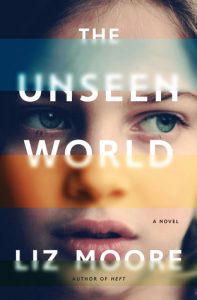The Unseen World
 Author: Liz Moore
Author: Liz Moore
Release Date: July 26, 2016
Publisher: W.W. Norton & Company
Source: Publisher
Genre(s): Science fiction; fiction
Review Spoilers: medium
I really wanted to like this book; unfortunately, I just couldn’t finish it.
The Unseen World is a story about a little girl, Ada, who lives with her computer scientist father. Growing up steeped in MIT lab culture, Ada is precocious and wildly intelligent, but she has difficulty relating to her peers in social situations. Her father succumbs to Alzheimer’s when Ada is young, and the rest of the book I read involves her coping with the loss of her quirky, brilliant father’s mind and learning about the mysterious artificial intelligence system he left behind.
I thought I would enjoy this book because I like reading mysteries and I spent most of my college years working in a science research lab. Reading about lab culture in this book felt authentic to my experiences, and seeing the world through Ada’s young scientist eyes felt natural.
Unfortunately, the pace of this novel was ploddingly slow and filled with overly descriptive paragraphs with very little action. This novel felt like a very long slice-of-life which examined the narrator’s emotional state in excruciating detail.
Honestly, it’s the level of detail which turned me off this book. The science here is well explained and never felt condescending , but the emotional doldrums of Ada’s humiliation in front of her peers and sadness at seeing her father slip away was just too much.
Author Liz Moore does exceptionally well at making the reader feel Ada’s feelings; reading about her struggles relating to other children on her first day of school was painful – the secondhand shame and embarrassment felt too real and brought me back to my own painful schoolyard memories of being bullied. This book triggered that feeling where, out of nowhere, you remember something horribly embarrassing you did five years ago and you shamespiral. It’s shamespiral-inducing.
Which is, when you think about it, a mark of really spectacular writing. Books aren’t always there to entertain or make readers feel good. They’re sometimes there to make readers feel uncomfortable or to challenge their world views. In this case, the prose in Unseen World made me feel things, negative things, so intensely that I had to put the book down.
Ada’s father’s battle with dementia is conveyed with equal parts respect and tragedy. Watching him slip away to disease is heartbreaking, and yet another reason why I had to put this book down. Other authors have written about Alzheimer’s (e.g. Go Ask Alice comes to mind), but the heaviness and the banal, plodding, everyday tragedy of the disease was portrayed so beautifully here unlike I’ve read in other books.
Again, there is nothing wrong with this book. I’m just not the right audience for it. It’s thematically heavy, and its prose is extremely descriptive.
Final Thoughts: I wasn’t in the right emotional state to read this book and to feel the intense emotions Ada was feeling, and for that reason I left it unfinished. But if you’re willing to read some truthful, stinging, immediate and real prose, prose that makes you feel what the narrator is feeling, even if those feelings are unpleasant, give this book a try.